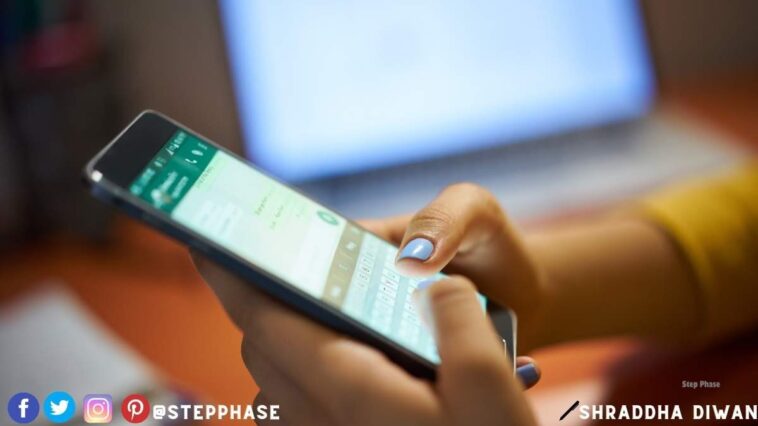Sharing screenshots has become commonplace on social media and messaging apps. Many ignore it, but sharing a screenshot of a private conversation or an email can get you in big trouble …
There is no law about the screenshot itself – and it might not be necessary – but rather several different laws depending on the content represented in the image. In the eyes of the law, if shared content is originally available for everyone to see, re-sharing it shouldn’t be a problem – except in the case of copyrighted images. In theory, sharing a screenshot of a photo or newspaper article could get you in trouble. In practice, however, it is unlikely that a newspaper or photographer will sue if you have shared a newspaper article or photo on your Facebook. On a site, however, the bill may be steep… More and more professionals are using bots that scan the web in search of images illegally shared on private sites. In the eyes of the law, however, the real problem may arise when a screenshot discloses a private conversation without the consent of the interlocutor.
In Belgium, everyone has the right to respect for private life and this includes the secrecy of correspondence. The sharing – public or not – of the extract of a private conversation cannot in principle be done without the consent of the interlocutor or interlocutors. If one of the parties has not consented, there may be a breach of the privacy of that person. There is then a risk of being sued and having to pay reparations.
To this is added the General Regulations for the Protection of Personal Data (RGPD) which governs the matter at the level of the European Union, the latter applies in Belgium. In principle, it only covers the sharing of personal data – private discussion included – in a commercial or professional context. However, the European Court of Justice has ruled that the dissemination of personal data on the Internet goes beyond the domestic sphere from the moment the information is available to everyone, therefore an unlimited number of people. It must therefore be deduced that the GDPR also comes into play if the screenshot of a conversation is shared publicly on social networks like Twitter or Facebook.
In practice, it is obviously unusual for the right to the confidentiality of correspondence not to be invoked when an interlocutor shares a screenshot of a common conversation with other people, it is still necessary to be aware. In addition, it is not especially necessary that the injured party is recognizable, because the content of the conversation can also prejudice a third party, undermine honor or the right to non-discrimination linked to private life (comment homophobic, racist, anti-Semitic, misogynist,…). It is possible to obtain compensation in proportion to the damage caused to you in one way or another.
Let’s say your best friend told you on WhatsApp that he cheated on his partner and you sent a screenshot of the conversation to the person afterward. This situation may seem trivial, but the damage done to your (ex-) friend could get you into legal trouble, because there is an invasion of the privacy of your interlocutor. However, nothing would have legally prevented you from warning your girlfriend by rephrasing, it is the photographic reproduction of the private conversation that is in reality the problem.
The same is true if you insult your boss in a private text message to one of your coworkers. Nothing will stop your boss from firing you if they get a screenshot of that problematic conversation. However, you can use your colleague for having shared the content of your exchanges without your agreement, and moreover for having drawn you into serious trouble.
In a professional context, it may be prohibited to share information on a contractual basis. Often, the employment contract also includes clauses related to the reputation of the company. Sharing professional emails without the consent of each party can therefore get you into trouble.
There are countless examples of this type and the penalties incurred will be systematically proportional to the harm suffered by the victim. In general, you should therefore be very careful with sharing screenshots.
Note, however, that when it is a tweet, a Facebook message on an open account, or publicly available information, re-sharing the message in theory poses no risk.
Some exceptions
As always, there are exceptions. What if the sharing of a screenshot of a conversation is done for the purpose of obtaining justice in the face of harassment, for example? This is still debated. Indeed, a publicly incriminated person without legal background could potentially file a complaint for slander and defamation.
Jean Herveg is a professor and researcher in digital law at UNamur and a lawyer, according to him, we must think about the strategy to follow to denounce harassment: “ Usually the first advice we give people is to file a police complaint about harassment. Unless we are obviously in the hypothesis of a fight against the law of silence. In which case it is better to seek legal advice to ensure that freedom of expression operates effectively without backfire, ”he says.
In reality, nothing is legally defined, it will always be necessary to navigate between freedom of expression and the protection of privacy. “ The secrecy of correspondence can give way to a higher legitimate interest. There is therefore an assessment to be made. I fully understand why a person would want to post a screenshot for justice, but the question is whether it is the most effective thing to do, ”says Jean Herveg.
Moreover, if the public authorities have already been warned of the misdeeds that we want to denounce, but nothing happens, we must be able to “ shake the coconut palm ”, “to make everyone know what has happened, to that there is pressure from the public, that the authorities get started and recognize the wrong “, explains the lawyer. We then fall into the hypothesis of flagrant injustice to which no one can remedy, “ freedom of expression is also used for that ”, according to him.
An exception remains, however, for public figures. They are not subject to the same degree of protection of their privacy as an average individual, as long as this has an appeal with their public activities. This also applies to the other cases of this article. In cases where sharing screenshots of them feed into public debate, it is more easily justifiable to do so. But if and only if it fuels the public debate. Defamation remains punishable.
Be that as it may, the reprehensible cases presented in this article are paradoxically highly prevalent in modern uses of social networks and messaging.
Is it illegal to take screenshots or photos of people?
The legality of screenshotting a picture of someone depends on the situation in which it was taken and how it was utilised, so there is no clear-cut answer. Generally speaking, unless it violates the subject’s privacy or puts them in danger, taking a screenshot of a photo without their consent is not likely to be illegal. Whenever a picture is protected by copyright laws, capturing a screenshot of it is deemed illegal.
Several criteria determine whether it is acceptable to screenshot content from social media. These include any applicable copyright or privacy regulations as well as the terms and conditions of the specific social media network.
FAQS :
Taking screenshots is not a problem. It’s sending them to people without consulting the second party which can create legal issues
Note: I’m not a lawyer
It depends.
Example A: In the expectation that it will remain secret between you, you send someone a message expressing love and desire. The person you’re in love with publicly mocks you after seeing it online. Although that individual is abhorrent, your privacy has not been violated because you gave them your consent to do so, and they are free to comply with your requests or not.
Example B: A letter suggesting romantic desire is discovered by someone who hacks into your email account. On the internet, they publish it. You now have a scenario you can act upon. Your right to privacy was not in any way compromised.
There are numerous such instances, but in most cases, it comes down to how legitimate the expectation of privacy is. Consult a lawyer to get advice on your specific circumstances.
Disclaimer:
This response is not intended to be a replacement for counsel from a lawyer. This response is neither an invitation to provide legal advice nor does it establish an attorney-client relationship. There is no obligation to keep confidential material private or refrain from representation that would be detrimental to your interests if you choose to disregard this caution and share sensitive information in a private message or remark. Prior to making any decisions that could have an impact on your rights, get the counsel of a qualified attorney in the relevant jurisdiction. Consult an attorney right away if you think you have a claim against someone to avoid losing the opportunity to file your claim before it’s too late.
No. Even while I strongly believe that going to court should only be done as a last resort and only if reaching an amicable resolution appears to be unattainable, it is a better option for society than hiding out in a dark alley with a pipe. It also seems more honorable to me to file a lawsuit against someone rather than merely complain about how unfairly they have acted.
I am, however, sufficiently influenced by the social stigma some associate with court appearances that, whenever I mention that I have appeared in court frequently in my life, I almost always make sure to add that I was representing a client.
Disclaimer:
This response offers broad knowledge on the law, the practise of law, or related topics. It should not be regarded as advise because it is not being given as such.
Although the author holds a law degree and has worked in the legal field in the UK in the past, she does not now act. A lawyer or other person qualified to work as a lawyer in their jurisdiction should be consulted by anyone with particular inquiries regarding any legal matter.
I’d say no unless it was someone in a position of authority, such as a doctor, lawyer, or member of the clergy, but you can still try.
The issue is that if you sue someone, the tale gets longer, is made public, and you are forever associated with it.
Sometimes it’s best to minimise the damage and carry on with your life.
I understand that it is difficult right now, but in the long term, consider it a lesson.
You may like:
We are here to hear from you
After all, you can contact us to let us know if we are missing something on our page. I hope you like and thank you for your visit








GIPHY App Key not set. Please check settings